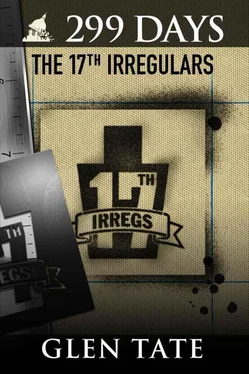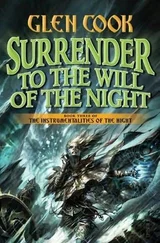Winters knew what the FCorps asshole would say: “Take down Pierce Point. Arrest the teabaggers out there.” He had his hands full with the Mexican gangs and the Blue Ribbon Boys and didn’t need this. He didn’t need Olympia to withhold the food.
But, if Winters sent his guys out to Pierce Point to haul in those hillbillies, his cops and Blue Ribbon Boys wouldn’t be in Frederickson to protect Winters’ investments. Winters was the most powerful man in Frederickson, but he didn’t have the resources to go several miles out to Pierce Point and arrest some teabaggers. Winters was amazed that the stupid townspeople didn’t realize how stretched thin the “authorities” were. Besides, Bennington told Winters a few weeks before that Pierce Point had some amazing defenses and a gate. They even had attack dogs. The last thing Winters wanted was to fight some whackos out there when, instead, those people could be loyal customers.
He thought of the perfect solution. Rich Gentry, who used to work for Winters as a Sheriff’s deputy, was running Pierce Point. Rich had come in a few weeks earlier and signed up everyone at Pierce Point for FCards. Rich was a guy Winters could work with. He was a guy Winters could make a deal with.
Rich wouldn’t be part of this Patriot nonsense, Winters thought. Rich had a good head on his shoulders. Winters stumbled—it was almost 4:00 a.m.—into the “Incident Command Center” in the courthouse, which was where they had all the radios.
“Get me Bennington,” Winters said to the dispatcher, who was half asleep. It took about a minute for Bennington to come on. Winters had woken Bennington from a nap.
“What can I do for you, boss?” Bennington asked on the radio.
“Go out to Pierce Point and get me Rich Gentry,” Winters said. “I need to talk to him. He’s not under arrest or anything, I just need to talk to him.” Winters paused. Should he tell Bennington what was going on? It was a secure radio and, besides, if Winters had been handed this fax, then everyone else in the courthouse had seen it. There was no way to keep this thing a secret.
“Pierce Point has some ‘Patriot’ thing going on,” Winters continued. “They hung some dopers and have a newspaper called the ‘ Patriot .’ Olympia wants to shut that down. Rich Gentry needs to understand that we can’t have that militia stuff in this county.”
Bennington realized that just talking to Rich wouldn’t solve the “Patriot problem” at Pierce Point. He had been out there and seen how organized and serious they were. Winters was a delusional politician holed up in a bunker who thought he could make deals and intimidate people, like this was the old days.
But, whatever. Taking Rich into town to see Winters wasn’t a big deal, Bennington thought. Bennington was curious to go back to Pierce Point. He envied their independence and wished he could be out there instead of being Winters’ errand boy.
Bennington looked at the clock. It was 4:01 a.m. He would get another couple hours of sleep and then go get Rich.
Chapter 187
“What’s for Breakfast?”
(July 9)
Rich Gentry slept in. Way in. By habit, he usually got up at 5:00 a.m., but this morning he woke up at 8:12 a.m. He slept in because he had been out almost all night with Ted and Sap showing them the Marion Farm.
Rich got up quietly—as he had for years—and got dressed for work without waking his wife, Amy. She was usually up by now, but had been working a lot on planning for the school in the fall and was sleeping in, too.
Amy was thirty six, the same age as Rich. She was a pretty country girl. They had been high school sweethearts. Before the Collapse, she had been a teacher.
Amy and Rich always wanted kids, but Amy couldn’t have them. They talked about adoption for years, but in the years before the Collapse, one of the first things to be cut out of government budgets was adoption services. Even without the loss of government funding, the regulations and red tape for adoptions were completely out of hand. It seemed like for each kid adopted, there were two full-time government employees. Now that government had been forced out of the adoption business—and it was a business for government—the old kind of adoptions were possible again, which meant people informally took in orphans on their own, without all the government bureaucracy. It was pretty simple: a good family took in kids. People had been doing it for a few thousand years all over the world and it worked pretty well.
The pre-Collapse government’s attitude toward adoptions had always amazed Rich. He couldn’t understand why they put up barriers to doing something as great as adopting kids. Because the government made more money administering foster care, that’s why.
But, not anymore. One of the only good things about the Collapse—and, at this point, the good things were far outweighed by the bad things—was that the government monopoly on, and discouragement of, adoption was over.
Amy had been eyeing the many kids that become orphans or displaced from their families and told Rich that she wanted to adopt them. He was open to it, but he worked twelve- to sixteen-hour days and wasn’t getting around to it. He told Amy to find some kids and they’d just take them in. Amy was thrilled. Rich was nervous about it because he’d never been a dad before. He hoped he’d do a good job. He knew the very long days would start to wind down as others were trained out there and life stabilized. That was already happening.
For the first time, Rich and Amy actually thought about having kids and a semi-normal life. This hope had unleashed a new spark in Rich and Amy’s life. They were cuddling like teenagers and things had never been better in the bedroom.
But, there was none of that this morning. Rich had to get out to the Grange for the “breakfast briefings,” as he called them. He got a report from Dan on the gate, the Chief on the beach patrol, and about a thousand other people, all of whom had a problem of some kind.
Rich and Amy lived about a mile from the Grange. His job required him to drive all over Pierce Point, so he had a personal vehicle. He was one of the few who always had the gas to drive around. Because all his driving was for Pierce Point business, people would just show up at his house with gas cans. As scarce as gas was, most people realized it was a good idea to have the coordinator of the community’s security be able to drive around. This is not to say that everyone helped with gas. Of the five hundred or so houses at Pierce Point, maybe fifty were willing to give Rich a gallon or two of gas, but that was enough.
Rich got in his truck and turned on the radio. His favorite station, 107.1 Hot Country Hits, was back on the air. It had been static for the past few weeks, but now there was music back on. No DJs talking, just music. They must have a computer playing the songs. That was an improvement; both the fact that there was music again and that there were no obnoxious DJs. The authorities probably realized that people needed things like their favorite music on the radio to help them feel like things were “normal.”
It was working. Rich was transported back in time a few years by a song that reminded him of the easy life, not too long ago. Of life before the Collapse. For a moment, he felt like he was back at the Sheriff’s department driving into work.
That ended when he pulled into the Grange. Rich’s old routine from a few years ago didn’t include a parking lot full of people at the Grange. It had always been empty back then.
He got out and said good morning to everyone and went into the Grange where Linda, the dispatcher, waved for him to come over. Dan was on the radio.
Читать дальше











